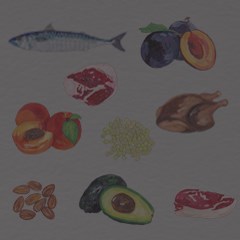We’re rapidly becoming more aware of the dangers of what is now known as being overfat, and the main culprit is – you guessed it – sugar.
When did something nature deliberately put into apples, pears and bananas become a deadly source of ill-health? The answer lies not in the little sucrose molecule itself, but in the sheer quantity of sucrose and the newer, closely-related chemical variants, that endlessly tickle our taste buds.
Humans have an exquisitely complex ability to distinguish sweetness. Our tongues are coated with thousands of taste receptors dedicated to the task, and they can detect subtle variations between a range of closely related chemical compounds.
The problem with sugar lies in its abundance and its cheapness. For the food industry this means sugar is a logical “secret” ingredient. Without sugar, many foods, from hamburger buns to the liberally applied ketchup, would taste very different. Some foods might even be unpalatable. The mantra of food manufacturers has become: If it doesn’t taste good, add sugar! If it’s not selling well, add sugar! If you want kids demanding it, add sugar! If you want consumers to crave it, add sugar!
As if sugar (sucrose) wasn’t cheap and abundant enough, by chemically modifying corn starch, an even sweeter (and cheaper) form of sugar known as high-fructose corn syrup was created in the 1950s. Thanks to its unique chemistry, and extra fructose (normally one half of a sucrose molecule), this concoction is even sweeter than sucrose. Variations of this fructose-laden chemical can be found in everything from pasta sauce to bread.
Evidence of the health damage excessive sucrose can cause, from hormonal disturbances to dental decay, mounts each year. Research also points to the hidden dangers of fructose, which behaves very differently in the body. Its metabolism in the liver appears to trigger oxidative damage that increases the risk of long-term liver damage and possibly cirrhosis.
So cutting sugar from your diet not only eliminates empty calories, but also potentially deadly chemical compounds. There is mounting pressure around the world for governments to introduce sugar taxes or limits on its advertising, but behind the scenes many food companies are quietly working on ways to trim sugar levels without affecting taste.
In the meantime, you’ll need to do the detective work yourself and identify where and how you can best eliminate excess sugar form your life. There are few scientific studies looking at the best way to cut sugar. You can either go “cold-turkey”, or you can adopt a gradual elimination plan. When it comes to your morning coffee, quitting sugar outright is the best way to change habits. Beyond that, you will need different strategies. But you’ll be amazed by how many things are just fine without any added sugar.
10 STEPS TO CUTTING YOUR SUGAR INTAKE
Watch those drinks
Most people would gag at the thought of swallowing nine teaspoons of sugar, some artificial flavoring and a cup and a half (375ml or 12 ounces) of carbonated water. But that’s what’s in a typical sugar-sweetened fizzy drink. Also, many drinks claiming to contain natural fruits, to be preservative-free or rich in vitamins and minerals pack the same sugar punch as major brand sugary drinks. Eradicate all sugary drinks from the fridge and cut out impulse convenience store purchases.
Fresh fruit and vegetables are always better
Isn’t fruit naturally rich in sugar? Yes, but when you consider the alternatives, there is far less sugar in whole fruit than just about all varieties of candies and sweets, as well as most supposedly healthy muesli snack bars. Fruit is nature’s ready-made snack.
Go easy on those pasta sauces
Many savoury tomato-based sauces, including ketchup, are jam-packed with sugar. It pays to look carefully at the label and find those that are lowest in added sugar. Better still, make your own. Simply mix canned or fresh tomatoes, some fresh herbs and simmer.
Same goes for salad dressings
Enjoying a healthy salad? Adding a splash of dressing? Think again. Supermarket salad dressings can be a hidden source of sugar, so maybe it’s time to try your own – a drizzle of Balsamic vinegar and extra virgin olive oil is a sensational dressing. Mix in some fresh herbs, try lemon juice or pomegranate vinegar for that extra pizazz.
Cultivate a natural yogurt habit
Stop and take a careful look at your yogurt tub. Most fruit yogurt is sweetened to the max. Cut to natural yogurt. Need a sweet rush? Add fruit!
Desert the dessert
These are almost always sugar-laden. Spend a few moments looking at the label on your favorite ice cream – sugar, lots of sugar! A fresh fruit salad is a nice, natural alternative, but the main thing is moderation, so avoid desserts with every meal.
Bitter is better
Chocolate is a sweet indulgence that should remain an occasional one. If you must break into a fresh block, choose dark chocolate. What’s not cocoa/cacao is generally sugar, so the darker the better. And don’t forget to share.
Say when to pre-mixed alcoholic drinks
Ready-mixed spirits or spritzers often have the same levels of sugar as any other carbonated beverage. Check the sugar content of your favorite tonic too.
Find replacement taste sensations
There is a whole world of flavor to be enjoyed, so open your palate to the many intense, spicy, bitter, intriguing and wonderful tastes out there. Plus, adding spice such as turmeric, chilli, coriander, cumin or nutmeg not only adds taste, it can have health benefits too.
Remember, keep an eye out for sugar in disguise
There are dozens of different names for sugar listed on food labels. The more common names you’ll see are: sucrose, high-fructose corn syrup, barley malt, coconut sugar, dextrose, maltose, rice syrup, and fruit juice concentrate. Very few foods actually label themselves low in sugar, so you will have to search for yourself.

Professor David Cameron-Smith is a regular Fit Planet contributor. A transplanted Australian living in New Zealand, he obtained a PhD in nutritional biochemistry from Deakin University, and undertook postdoctoral training at the Royal Prince Alfred Hospital, Sydney. His research interests include the importance of nutrition in the maintenance of optimal health in an ageing population, and the impact of nutrition in regulating the function of muscles.
Follow the freshest thinking @fitplanetmag.








